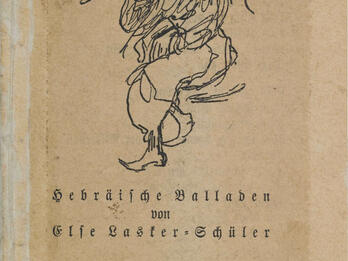At the Road
Dovid Hofshteyn
1925
Creator Bio
Dovid Hofshteyn
Author of some of the most delicate and artful lyrics of the questing self, of love, and of family life in Yiddish poetry, Dovid Hofshteyn was compelled by history to become an equally accomplished poet of mourning in the face of the 1919 slaughter of Jews in his native Ukraine, and thereafter became a leading figure in the Soviet Yiddish literary scene. Born in Korostyshev, near Kiev (today in Ukraine), he experimented with Hebrew, Russian, and Ukrainian verse before settling on Yiddish. Already before World War I, Hofshteyn had become a masterful craftsman of lyric beauty. This was reflected in his melancholy 1912 poem “In Vinter farnakhtn” (In Winter Evenings)—which achieved such resonance in Yiddish-reading circles that it was recited as a song of longing for home by Soviet Jewish soldiers during World War II—and in his pre-1919 credo-poem “Bay vegn” (At the Road). By 1919, when he published his first book of poetry, Hofshteyn was seen by one leading critic as the first truly European poet writing in Yiddish and by another as already falling behind the more clangorous futurism of his contemporary Peretz Markish. Amid the 1918 and 1919 slaughter in Ukraine, Hofshteyn declared himself for the Revolution and wrote some of the first resonant revolutionary Yiddish poetry. During that time, he worked with pogrom orphans, alongside Marc Chagall, who illustrated Hofshteyn’s 1922 poetry collection Troyer (Mourning). Hofshteyn became a guide to the first “native” generation of Soviet Yiddish poets in the early 1920s. In 1923, balking at the suppression by the Yevsektsiia (a Jewish section of the Soviet Communist party) of the Hebrew language, Hofshteyn moved to Palestine for a short time and even translated some of his own work, including “Bay vegn,” into Hebrew. But after further time in Europe, Hofshteyn returned to the Soviet Union as a politically suspect but highly regarded poet and wrote extensively. Given his history of anti-Soviet activities, Hofshteyn was the first member of the Jewish Anti-Fascist Committee to be arrested by Soviet authorities during the postwar repression of Jewish culture. He was executed alongside other members of the Soviet Yiddish intelligentsia on August 12, 1952. The Dovid Hofshteyn Prize for Yiddish Literature was established in his name in Tel Aviv in 1987.
You may also like
In the Subway I
The Jew
In the Port
Still Life
Piyyut in Honor of R. Faradji Chaouat



